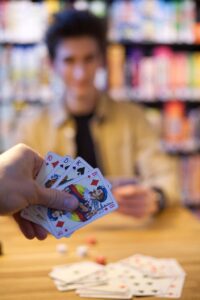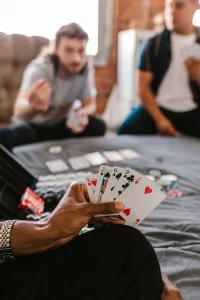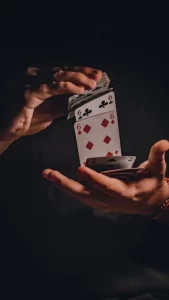The Psychological Playbook of Poker: A Player’s Guide is a comprehensive book that delves into the intricate world of poker psychology. Written specifically for poker players, this guide explores the various psychological strategies and tactics that can be employed to gain an edge over opponents at the poker table. By understanding the psychological aspects of the game, players can enhance their decision-making skills, control their emotions, and manipulate their opponents’ behavior. Whether you’re a novice or an experienced player, this playbook offers valuable insights and techniques to improve your overall poker performance.
The Impact of Psychological Strategies on Poker Success
The game of poker is not just about the cards you hold or the bets you make. It is a complex battle of wits, where psychological strategies play a crucial role in determining who emerges as the victor. In this article, we will explore the impact of psychological strategies on poker success and provide a comprehensive guide for players looking to improve their game.
One of the most fundamental psychological strategies in poker is bluffing. Bluffing involves convincing your opponents that you have a stronger hand than you actually do. This can be achieved through various tactics such as maintaining a stoic facial expression, controlling body language, or even employing verbal deception. The ability to successfully bluff requires a keen understanding of human psychology and the ability to read your opponents’ reactions.
Another important psychological strategy in poker is the art of observation. By carefully observing your opponents’ behavior and patterns, you can gain valuable insights into their playing style and tendencies. This information can then be used to your advantage when making decisions at the table. For example, if you notice that a particular player tends to fold when faced with aggressive betting, you can exploit this weakness by placing larger bets when holding strong hands against them.
Psychological strategies also come into play during the decision-making process in poker. Making rational decisions based on probabilities and expected value is essential, but emotions can often cloud judgment. Experienced players are able to control their emotions and make logical decisions even under pressure. They understand that getting emotionally attached to a hand can lead to poor decision-making and unnecessary losses.
Furthermore, the concept of “table image” is another psychological aspect that can greatly influence poker success. Table image refers to how other players perceive your playing style and behavior. A tight and conservative player is likely to be seen as cautious and only betting with strong hands, while an aggressive player may be viewed as reckless and prone to bluffing. Understanding how others perceive you at the table allows you to adjust your strategies accordingly and exploit their expectations.
Building a strong psychological profile is not just about understanding others; it also involves self-awareness. Recognizing your own biases, weaknesses, and tendencies is crucial in developing a winning mindset. By identifying areas for improvement, you can work on strengthening your game and avoiding common pitfalls. This self-reflection allows players to continuously evolve and adapt their strategies to stay ahead of the competition.
In conclusion, the impact of psychological strategies on poker success cannot be overstated. Bluffing, observation, decision-making, table image, and self-awareness all play significant roles in determining who emerges as the victor in this game of skill and strategy. Aspiring poker players should invest time and effort into mastering these psychological aspects, as they are just as important as understanding the rules and mathematics of the game. So next time you sit at the poker table, remember that your cards are only part of the equation – the true game lies in the psychological battlefield.
Understanding the Role of Emotions in Poker Decision-Making
Poker is a game that requires skill, strategy, and a keen understanding of human psychology. While many players focus on the mathematical aspects of the game, it’s essential to recognize the role emotions play in poker decision-making.
Emotions can be both a player’s greatest asset and their biggest downfall. When managed effectively, they can provide valuable insights into opponents’ hands and help guide strategic decisions. However, when left unchecked, emotions can cloud judgment and lead to costly mistakes.
One emotion that often comes into play during poker games is fear. Fear can manifest in different ways, such as a fear of losing money or a fear of making the wrong move. This fear can cause players to become overly cautious, leading them to miss out on potential opportunities to win big pots. It’s important for players to recognize and manage their fear, using it as motivation to make calculated risks rather than letting it dictate their actions.
Another emotion that can greatly impact poker decision-making is anger. Losing a hand or experiencing a bad beat can trigger feelings of frustration and anger. These emotions can lead to impulsive decisions and reckless betting, as players try to quickly recover their losses. Recognizing this tendency and learning how to control anger is crucial for maintaining composure at the table and making rational choices.
On the flip side, happiness and excitement can also influence poker decision-making. Winning a big pot or hitting a lucky card can create a rush of positive emotions. While these feelings are enjoyable, they can sometimes lead to overconfidence and irrational decision-making. Players must remain grounded and focused, even when experiencing success, to avoid falling into traps set by more observant opponents.
Understanding the role of emotions in poker decision-making also involves recognizing the emotions displayed by other players. Observing opponents’ body language, facial expressions, and verbal cues can provide valuable information about the strength of their hand and their intentions. A player who appears nervous may be bluffing, while a player who seems overly confident may have a strong hand. By paying attention to these emotional cues, players can make more informed decisions and gain an edge in the game.
However, it’s important to note that emotions can be deceptive. Skilled players are adept at disguising their true feelings, using them as tools to manipulate opponents’ perceptions. This is where emotional intelligence comes into play. Players with high emotional intelligence can read and interpret others’ emotions accurately while controlling their own emotional responses. Developing this skill takes time and practice but can significantly enhance a player’s ability to make strategic decisions based on emotional cues.
In conclusion, understanding the role of emotions in poker decision-making is crucial for any serious player. Fear, anger, happiness, and other emotions can greatly impact a player’s choices at the table. Recognizing and managing these emotions, both in oneself and in opponents, is key to making rational and profitable decisions. By developing emotional intelligence and remaining composed, players can navigate the psychological aspects of the game and increase their chances of success.
Mastering the Art of Bluffing: A Psychological Approach
The game of poker is a complex and strategic one, requiring players to not only understand the rules and strategies but also to master the art of bluffing. Bluffing, in essence, is the act of deceiving opponents into believing that you have a stronger hand than you actually do. It is a psychological technique that can be incredibly effective when executed correctly.
To become a skilled bluffer, one must adopt a psychological approach. Understanding human behavior and using it to your advantage is key. The first step is to study your opponents closely. Pay attention to their body language, facial expressions, and betting patterns. These cues can provide valuable insights into the strength or weakness of their hands.
A successful bluff requires careful timing. You must choose the right moment to make your move. This often means waiting for a favorable situation where your opponents are more likely to fold. For example, if the community cards on the table suggest a strong hand, your bluff is more likely to succeed as your opponents may assume you have a winning combination.
Confidence is another crucial element in bluffing. Projecting an air of certainty and control can intimidate your opponents and make them doubt their own hand. Maintain a steady demeanor, avoid fidgeting or showing any signs of nervousness, and keep your emotions in check. Remember, a good bluffer never gives away any hints about the true strength of their hand.
One effective tactic in bluffing is known as the “semi-bluff.” This involves making a bet or raise even though your hand is not yet complete, but has the potential to improve with future community cards. By doing so, you create the illusion of having a strong hand while still allowing yourself a chance to win if the next card matches your desired outcome.
However, it is important to note that bluffing should be used sparingly. Overuse of this strategy can lead to predictability and ultimately diminish its effectiveness. A wise player knows when to bluff and when to fold. It is essential to evaluate the risks and rewards before attempting a bluff, considering factors such as the size of the pot, your position at the table, and the playing style of your opponents.
Furthermore, adapting your bluffing technique to different opponents is crucial. Some players are more likely to call or raise regardless of their hand, while others are cautious and conservative. By tailoring your approach to each individual, you can exploit their weaknesses and increase your chances of success. This requires careful observation and adaptability throughout the game.
Lastly, it is important to remain mindful of your own image at the poker table. If you develop a reputation for being a frequent bluffer, other players may be more inclined to call your bluffs. Therefore, mixing up your gameplay and occasionally showing strong hands when bluffing can help maintain an element of surprise and keep your opponents guessing.
In conclusion, mastering the art of bluffing in poker requires a psychological approach. By studying opponents, choosing the right moment, projecting confidence, utilizing semi-bluffs, and adapting to different players, one can become a formidable bluffer. However, it is crucial to exercise caution and avoid overusing this strategy. Bluffing should be a carefully calculated move that takes into account various factors and ultimately enhances your overall poker game.
Developing Mental Resilience for Long Poker Sessions
Poker is not just a game of cards; it is a psychological battle where mental resilience plays a crucial role. Whether you are a beginner or an experienced player, developing mental strength is essential for enduring long poker sessions and increasing your chances of success.
One key aspect of mental resilience in poker is maintaining focus throughout the game. Distractions can be detrimental to your decision-making abilities and ultimately cost you valuable chips. To combat this, it is important to practice mindfulness and train your mind to stay present at the table. By staying focused on the current hand and avoiding thoughts about past mistakes or future outcomes, you can make better decisions based on the information available to you.
Another vital element of mental resilience is managing emotions effectively. Poker is a rollercoaster ride of highs and lows, with wins and losses coming one after another. It is easy to get carried away by emotions such as frustration, anger, or excitement, but allowing these emotions to control your actions can lead to poor decision-making. Successful players understand the importance of emotional stability and find ways to regulate their feelings during the game. Taking deep breaths, using positive self-talk, or even taking short breaks can help you regain composure and make rational choices.
In addition to managing emotions, maintaining a confident mindset is crucial in poker. Doubt and self-doubt can erode your decision-making abilities and hinder your overall performance. Developing a belief in your skills and strategies is essential for playing your best game. Confidence comes from experience, so it is important to invest time in studying the game, analyzing previous hands, and learning from your mistakes. As you gain more knowledge and experience, your confidence will naturally grow, allowing you to trust your instincts and make bold moves when necessary.
Furthermore, adapting to different situations is a skill that sets successful poker players apart. The ability to adjust your strategy based on changing circumstances is essential for long poker sessions. A rigid approach can lead to predictability, making it easier for opponents to exploit your weaknesses. Being flexible and open-minded allows you to adapt to different playing styles and make informed decisions based on the current game dynamics.
Lastly, maintaining mental resilience in poker requires a strong sense of discipline. It is easy to get carried away by impulsive decisions or tilt after a bad beat, but successful players have the discipline to stick to their strategies and avoid making emotional moves. Setting limits for yourself, both in terms of time and money, can help you stay disciplined and prevent unnecessary losses. Taking breaks when needed and practicing good bankroll management are also important aspects of maintaining discipline in poker.
In conclusion, developing mental resilience is vital for enduring long poker sessions and increasing your chances of success. Staying focused, managing emotions effectively, maintaining confidence, adapting to different situations, and exercising discipline are all key components of a player’s psychological playbook. By incorporating these strategies into your game, you can improve your overall performance and become a formidable opponent at the poker table.
Harnessing the Power of Observation and Psychology in Reading Opponents
Poker is a game that requires more than just skill in card playing. It is a psychological battleground where players must read their opponents and make strategic decisions based on their observations. In this article, we will explore the psychological playbook of poker and provide a player’s guide to harnessing the power of observation and psychology in reading opponents.
One of the most crucial skills in poker is the ability to observe and interpret non-verbal cues. These cues can provide valuable insights into an opponent’s hand and mindset. A player who can master the art of reading body language has a significant advantage at the table.
The first step in observing opponents is to pay attention to their physical demeanor. Are they relaxed or tense? Do they fidget or remain still? These subtle movements can reveal nervousness, confidence, or even deception. For example, a player who suddenly starts tapping their fingers may be anxious about their hand, while someone who maintains a steady gaze might have a strong one.
Facial expressions are another key aspect of observation. The eyes are often referred to as the “windows to the soul,” and in poker, they can reveal much about a player’s intentions. Dilated pupils can indicate excitement or anticipation, while avoiding eye contact may suggest discomfort or dishonesty. By closely studying these facial cues, a skilled player can gain valuable insights into an opponent’s emotional state.
Another essential aspect of observation is listening carefully to what opponents say or don’t say. Verbal cues can provide valuable information about a player’s thought process and strategy. Pay attention to the tone of their voice, pauses, and word choice. A sudden change in vocal patterns may indicate a shift in confidence or uncertainty. Likewise, silence can speak volumes – it could mean strength or weakness, depending on the context.
Psychology plays a significant role in poker, and understanding basic human behavior can give players a considerable advantage. One common psychological phenomenon in poker is known as “tilt.” Tilt occurs when a player becomes emotionally overwhelmed by a series of losses or bad beats, causing them to make irrational decisions. Recognizing when opponents are on tilt can allow players to exploit their emotional vulnerability and gain an upper hand.
Furthermore, the concept of bluffing is deeply rooted in psychology. Bluffing is the art of deceiving opponents into believing you have a better hand than you actually do. It requires a deep understanding of human behavior and the ability to manipulate others’ perceptions. By carefully observing opponents’ reactions during betting rounds, players can gauge the effectiveness of their bluffs and adjust their strategies accordingly.
To effectively harness the power of observation and psychology in reading opponents, it is crucial to remain calm and composed throughout the game. Emotions can cloud judgment and lead to poor decision-making. A skilled player must maintain a poker face, concealing any signs of excitement or disappointment. This level-headedness allows for clear thinking and accurate assessment of opponents’ behaviors.
In conclusion, mastering the psychological playbook of poker is essential for any serious player. The ability to observe opponents’ non-verbal cues, interpret facial expressions, listen to verbal cues, and understand basic human behavior can give players a significant advantage at the table. By harnessing these skills, players can read their opponents like an open book and make strategic decisions that lead to success. So next time you sit down at a poker table, remember to pay close attention – the real game is happening beyond the cards.In conclusion, “The Psychological Playbook of Poker: A Player’s Guide” provides valuable insights and strategies for players looking to understand and utilize the psychological aspects of the game. By focusing on topics such as reading opponents, managing emotions, and bluffing effectively, this guide offers players a comprehensive understanding of how psychology plays a crucial role in poker. With practical advice and real-life examples, readers can enhance their gameplay and increase their chances of success at the poker table.




